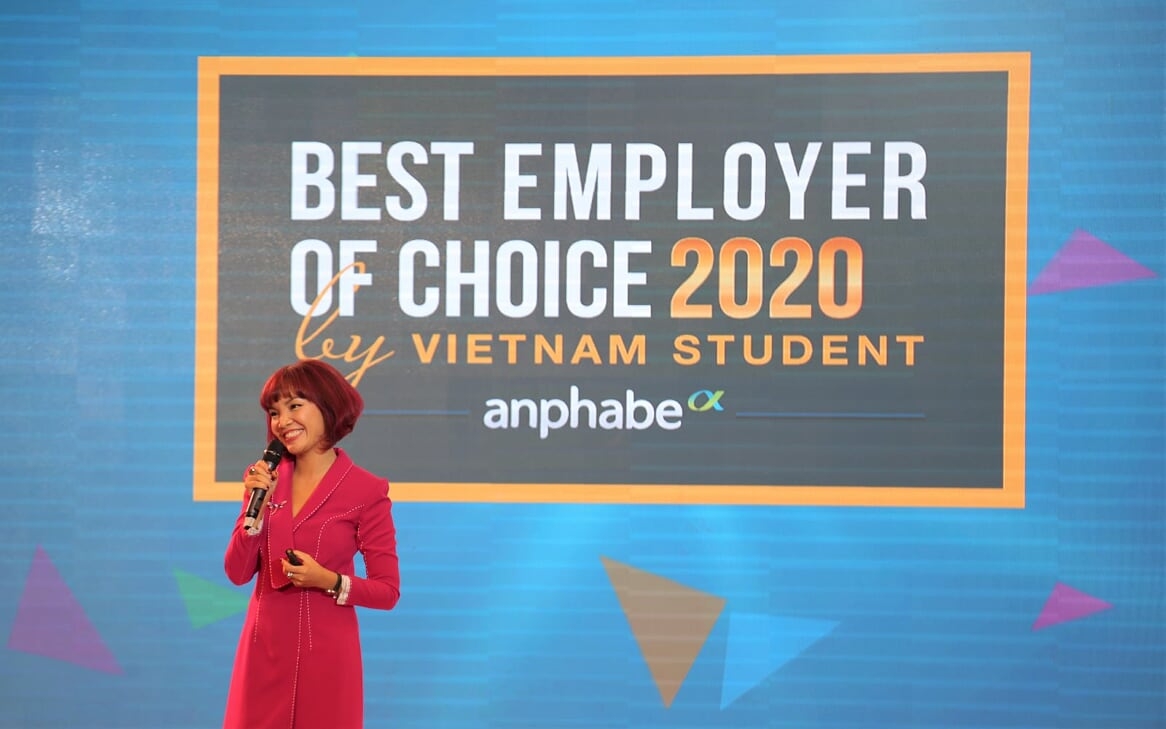Gen Z – the breakthrough generation or the disruptors?
 |
| Thanh Nguyen, CEO of Anphabe shared the results of the Gen Z – The Breakthrough Generation survey |
Gen Z are those born from 1998-2010 and are also called Centennials or iGens (those who have been possibly interacting with high-tech devices like smartphones and tablets since birth), multi-screeners (those simultaneously listening to music while playing games or shopping) or Chameleons thanks to the diversity in characteristics as well as life, learning, and working styles.
Different from previous generations, a minimum of 81 per cent of Gen Zers are certain they understand themselves well, including what job(s) and industry(ies) they like and do not like. In terms of factors that impact Gen Zesr’ career direction, surprisingly, they rely much more on self-passion and self-competence than influence from family and society (that is, social trends, economic conditions, or advice from parents and friends). Alarmingly, the survey also indicated that university counselling and employers’ activities have little impact at this stage of formulating and exploring career preferences.
This “shocking” reality shows that this young generation with their strong desire to “do-it-yourself” could pass over companies due to their lacklustre performance as career direction guides.
In addition, Gen Z are passionate for startups, love freedom, and are socially-oriented. Thus, Gen Z are making up their lists with very “open” choices after graduation. 34 per cent of gen Z students are willing to join startup businesses or even start their own business. 8 per cent disclosed that “freelance is just as good, no need to join an organisation”. 14 per cent would like to work for a non-profit organisation, indicating the growing tendency of social activism.
Unlike Gen Y and Gen X who yearn to work for multinational companies, Gen Zers show little problem with working for domestic companies. As the younger generation no longer follows the pattern set by their predecessors, businesses will have to navigate an even more aggressive talent war as supply narrows.
Furthermore, Gen Z is flexible and open to various career choices that may have minimal connection to their study major, employers will have to deal with unexpected talent competitors.
Advertising, media, and entertainment has prevailed as the most attractive industry, gaining the approval of students across study majors, even those from IT or engineering. Following is hospitality, being named among the top five most attractive industries of students from seven out of 10 study majors.
As netizens, Gen Z also earned the title of “truth hunters”. Because of their loyalty to “if you don’t know, ask Google, if you don’t understand, ask Youtube”, when choosing an employer, Gen Z will search and put almost all of their trust into information available on the internet and community evaluation, much more than their trust for advice from friends and relatives. Consequently, if businesses are not available online and fail to build their own “online power”, the ability to influence Gen Z will be limited.
The analysis on attitude indicates a contrasting picture where Gen Z is eager to learn but shy to take criticism; are willing to take responsibility and perform tasks and make decisions on their own but find it difficult to cope with pressure; highly adaptive but is not comfortable with frequent changes. To be able to deal with this generation, managers of this generation will have to have tricks up their sleeves to balance such conflicting characters, thus avoid regretful breakups.
To summarise, the challenges are sure to overthrow entrenched management methods and lead to conflicts over knowledge, culture, and collaboration styles. However, companies can get ready for this certain future by changing their points of view. If they can leverage these new trends well, they can seize opportunities to become faster and more creative, to transform, as well as to digitalise the workplace, and to setup the conditions to develop a new generation of leaders who can adapt to VUCA (Volatility, Uncertainty, Complexity and Ambiguity) leadership.
| Top 50 best employers of choice by Vietnamese students 2020 Top 50 Best Employers of Choice by Vietnam students 2020 includes an ensemble of many established organisations from both multinational and domestic sectors: Vinamilk, Coca-Cola Beverages Vietnam Ltd., Nestlé Vietnam Ltd., INSEE Vietnam, Abbott Laboratories S.A, Maersk Vietnam, Novaland Group, VNG Corporation, Nam A Bank, Wipro Consumer Care Vietnam, Hung Thinh Corporation, and Hoa Binh Construction Group, among others. In the competition for Best Employer of Choice by Vietnamese Students for each study major, the leading employers are: Computer Sciences – IT: FPT Corporation Electric/Electronics/Telecom/Automotive Engineering: Samsung Vina Electronics Natural Sciences: Acecook Vietnam Architecture – Design – Civil Engineering: COTECCONS Construction JSC Materials/Mechanical Engineering: VINFAST Agriculture – Forestry – Fishery: Greenfeed Vietnam Corporation Finance – Banking – Accounting: Vietcombank Medicine – Pharmacy – Nursing: Hoan My Medical Corporation Unilever has gained the top position of two study majors, including Social Sciences and Humanity & Economics – Business – Management |
What the stars mean:
★ Poor ★ ★ Promising ★★★ Good ★★★★ Very good ★★★★★ Exceptional
 Tag:
Tag:
Related Contents
Latest News
More News
- Vietnam financial markets on the rise amid tailwinds (February 11, 2026 | 11:41)
- New tax incentives to benefit startups and SMEs (February 09, 2026 | 17:27)
- VIFC launches aviation finance hub to tap regional market growth (February 06, 2026 | 13:27)
- Vietnam records solid FDI performance in January (February 05, 2026 | 17:11)
- Manufacturing growth remains solid in early 2026 (February 02, 2026 | 15:28)
- EU and Vietnam elevate relations to a comprehensive strategic partnership (January 29, 2026 | 15:22)
- Vietnam to lead trade growth in ASEAN (January 29, 2026 | 15:08)
- Japanese business outlook in Vietnam turns more optimistic (January 28, 2026 | 09:54)
- Foreign leaders extend congratulations to Party General Secretary To Lam (January 25, 2026 | 10:01)
- 14th National Party Congress wraps up with success (January 25, 2026 | 09:49)





















 Mobile Version
Mobile Version